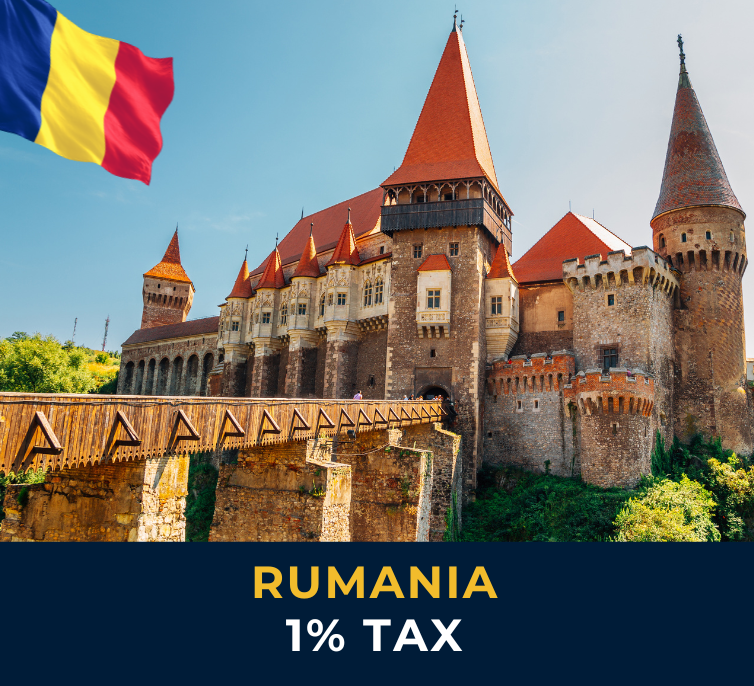In recent years, Romania has undergone an impressive turnaround, transitioning from being one of the poorest countries in the EU to turning its apparent disadvantage into a true strength.
The trick? Its affordable workforce and attractive tax incentives.
This has turned Romania into a magnet for investors and entrepreneurs, quickly becoming a popular destination for incorporating companies and obtaining tax residency for digital nomads.
In this article, you will learn about the tax advantages of obtaining residency in Romania, as well as the requirements to achieve it.
Taxes in Romania
Romania is, without a doubt, one of the best tax residences in the European Union.
It is characterized not only by its low tax rates (both for individuals and corporations) but also by the simplicity of its tax regime.
Among others, we find the following tax incentives for an individual obtaining Romanian tax residency:
- Flat income tax rate for individuals at 10%
- 0% Gift Tax
- 0% Inheritance Tax
- 0% Wealth Tax
- Income from interests and distributed dividends subject to an 8% tax rate
- General capital gains tax rate of 10%
- Exit tax applicable only to legal entities
Not bad, right?
However, these low rates contrast with the high mandatory social contributions that can apply (on certain minimum thresholds) if you wish to work as a self-employed person or freelancer registered in Romania:
- Contribution to pension insurance: 25%
- Contribution to health insurance: 10%
An interesting competitive advantage for businesses or freelancers with annual turnover below €88,500 is the exemption from VAT registration obligation.
Finally, it is worth noting that Romania has numerous Double Taxation Treaties with other countries, which benefits companies and individuals involved in economic and fiscal matters with this country.

Companies and Microenterprise Regime in Romania
If we talk about Romania, we have to mention without a doubt the magnificent tax regime of its companies (especially that of microenterprises).
The standard Corporate Tax rate is 16% for Romanian companies.
This 16% is somewhat high compared to other EU countries we recommend (Cyprus, Bulgaria, Ireland…), but it’s still clearly better than tax hells like Spain with 25%.
What’s really interesting about Romania is the tax regime applicable to the increasingly well-known Romanian microenterprises.
But what are they?
A Romanian microenterprise is a company that meets the following criteria:
- Annual turnover below €500,000.
- At least 1 full-time employee hired to work in the country (not a director).
- Effective office/address in the country.
The Corporate Tax for a microenterprise is applied to turnover and is only 1% up to the first €60,000 and 3% thereafter (up to €500,000).
If exceeding half a million, the standard 16% rate applies from the next quarter it was exceeded.
Therefore, business models can greatly benefit from this structure, as establishing substance with an employee and office is not particularly expensive in Romania and can be achieved with less than €8,000 per year.
At Tax Nomads, we specialize in creating structures in Romania quickly and simply with the lowest possible cost.
We must note that the requirements focus on turnover, so in businesses with narrow profit margins, this may not be advantageous.
Lastly, if your business is consulting to companies, interestingly this regime excludes you if such services exceed 20% of your turnover.
In conclusion, if you have a business with wide profit margins and your turnover ranges from €80,000-€500,000 annually, microenterprises could significantly reduce your tax bill.
Requirements to Become a Tax Resident in Romania
In Romania, we find the most common tax residency requirements among European and OECD countries:
- 183-day rule per year. Exceeding this figure makes you a Romanian tax resident.
- Center of economic and vital interests. Maintaining your center of interests in Romania also makes you a tax resident.
It’s important to remember, as with all tax residencies, that it’s not only important to meet the requirements of the country we wish to move to, but also to meet the requirements to cease being tax residents in the country of origin.
Immigration Requirements
Romania is not yet an official member of the Schengen Area.
However, its numerous agreements and EU membership allow nationals from many countries to enter Romania for short stays without a visa, including countries from the Schengen Area, EU, UK…
EU members can easily obtain a residence card in the country and settle permanently with the usual minimum requirements of having housing for the stay or demonstrating sufficient economic means to support themselves in the country.
For nationals of other countries, there is the Long-Stay Visa (Type D) for Romania, which allows the holder to enter Romania and apply for the right to stay in the country for more than 90 days (a Romanian residence card).
There is also a residence by investment type as a company director, but it does not offer one of the most interesting schemes within this type of residencies.
More information on visas and permits for Romania [here].
How is it to live in Romania?
Exploring the possibility of living in Romania can be intriguing.
Therefore, let’s analyze some relevant points for those Digital Nomads interested:
Political Stability
Romania, from a political and guarantee standpoint, presents notable challenges:
- Corruption levels are higher compared to other EU and Western countries.
- In administrative and fiscal matters, the country offers a relatively straightforward approach, provided that you have the right contacts.
Cost of Living
Living in Romania can mean substantial savings compared to other European countries.
- Costs of living, from rent to food, are significantly lower.
- The opportunity to subcontract or hire employees at competitive rates is a clear advantage for entrepreneurial profiles.
Networking for Tax Nomads
Bucharest, the Romanian capital, is becoming a magnet for digital nomads and online entrepreneurs.
- Opening bank accounts is efficient, and local banks are modern and effective.
- On the downside, while Romanians in cosmopolitan areas are improving their English proficiency, there is still much development needed in this regard, as well as in internationalization and community building for networking in Romania.

Our review on Romania Tax Residency
Taking into account all the points mentioned above, at Tax Nomads we consider Romania a country with great potential and one of the best tax residencies in Europe.
However, the most notable aspect is the microenterprise regime at 1-3%, for which residence in the country is not required and thus one can obtain tax residency.
Combining other tax residencies with dividend exemption regimes along with this microenterprise regime can lead to taxation very close to 0%.
Romania is a good tax residency for most profiles from a fiscal and economic standpoint, but it has certain drawbacks such as lower country development, limited English proficiency, and networking opportunities compared to other options.
Therefore, it is a tax residency worth considering, but the final decision will be heavily influenced by the personal preferences of each Tax Nomad.
Are you interested in obtaining residency or setting up a company in Romania?
Or would you prefer a complete analysis of your situation to discover the best option for you?
In either case, we can help!
Simply request your FREE INITIAL CONSULTATION BY CLICKING HERE, or contact us directly via WhatsApp or through the form below.
Contact us
The tax advantages of obtaining residency in Romania include:
- A flat income tax rate of 10% for individuals.
- 0% gift tax, inheritance tax, and wealth tax.
- Favorable tax rates on interests, dividends, and capital gains.
- Access to double taxation treaties with other countries. These incentives make Romania an attractive option for individuals seeking advantageous tax regimes within the European Union.
Opening a company in Romania costs between 1,500 and 3,000 euros.
The price may vary depending on the type of company, the legal services required, and other factors associated with the incorporation process.
The microenterprise regime in Romania benefits small businesses in the following ways:
- Application of a corporate tax based on turnover ranging from 1% up to the first €60,000 and 3% thereafter (up to €500,000).
- Less stringent requirements for hiring full-time employees and maintaining an effective office presence in the country.
These features make the microenterprise regime an attractive option for small businesses looking to optimize their tax burden in Romania.
To become a tax resident in Romania, individuals must typically meet one of the following criteria:
- Spend at least 183 days in Romania within a calendar year.
- Have their center of economic interests in Romania, indicating substantial ties to the country.
It’s important to comply not only with Romania’s requirements but also with the procedures to cease tax residency in your current country of residence.
In Romania, the tax rates are as follows:
- Individuals benefit from a flat income tax rate of 10%.
- There are 0% taxes on gifts, inheritance, and wealth.
- Interests and distributed dividends are subject to an 8% tax rate.
- The general capital gains tax rate is 10%.
- For corporations, the standard Corporate Tax rate is 16% (1-3% under micro companies regime)

